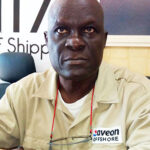Captain Tajudeen Alao (Master Mariners)
 The industry has been in comatose from the players and actors. Shipping is largely import based of manufactured goods and construction equipment with no local manufacturing and value addition processes.. These sorry situations are different from our hopes and aspirations of 30, 40, 50 years ago.
The industry has been in comatose from the players and actors. Shipping is largely import based of manufactured goods and construction equipment with no local manufacturing and value addition processes.. These sorry situations are different from our hopes and aspirations of 30, 40, 50 years ago.
Shipping decree 10 of 1987 has not increased our quota of UNCTAD position in 40:40:20 cargo sharing. 20 years after coming into force, the Coastal and Inland Shipping Act has not aided the expected growth to our fleet nor helped coastal players. The number of fishing boats in our register has decreased from 385 to less than 80. Many boats had been converted illegally to diesel carriers because of high cost of bunker, piracy and cold refrigeration facilities.
Dr. Segun Musa (Freight Forwarder)
 It is most unfortunate that, in the reassessment and the re-evaluation of this critical sector all indicators keep flagging negative. If we look at where we are coming from as a nation that inherited the performing sector from the colonial administration and out of greed, our government ran it down and shared the national heritage among themselves. Nigeria is at a standstill now because the government is not interested in any investments in the sector aside yielding revenues hence, pushing it to the private sector for repairs and maintenance.
It is most unfortunate that, in the reassessment and the re-evaluation of this critical sector all indicators keep flagging negative. If we look at where we are coming from as a nation that inherited the performing sector from the colonial administration and out of greed, our government ran it down and shared the national heritage among themselves. Nigeria is at a standstill now because the government is not interested in any investments in the sector aside yielding revenues hence, pushing it to the private sector for repairs and maintenance.
Otunba Sola Adewumi (NISA President)
 Nigeria maritime experience growth in the early 60’s with the introduction of NPA while in the early 80’s, Nigeria nationalized the maritime industry with the establishment of Nigeria National Shipping Line. 1990’s to 2000’s witnessed privatization which increased foreign participation. However security issues in the Gulf of Guinea, illegal fishing and oil theft are still major concern. In summary, Nigeria’s maritime industry has experienced growth, challenges, and reforms since gaining independence. While progress has been made in infrastructure development and liberalization, security issues remain a concern. The industry continues to be a vital component of Nigeria’s economy, with ongoing efforts to enhance its efficiency and competitiveness.
Nigeria maritime experience growth in the early 60’s with the introduction of NPA while in the early 80’s, Nigeria nationalized the maritime industry with the establishment of Nigeria National Shipping Line. 1990’s to 2000’s witnessed privatization which increased foreign participation. However security issues in the Gulf of Guinea, illegal fishing and oil theft are still major concern. In summary, Nigeria’s maritime industry has experienced growth, challenges, and reforms since gaining independence. While progress has been made in infrastructure development and liberalization, security issues remain a concern. The industry continues to be a vital component of Nigeria’s economy, with ongoing efforts to enhance its efficiency and competitiveness.
Mr Pius Ujubonu (ANLCA Chieftain)
 The maritime sector can be said to have been one part of Nigeria’s socio-economic life that has experienced tremendous development. The development cuts across structures and infrastructure. In the 50s when we had regional governments, the ports served as a very important structure and infrastructure used by the regions for export of produce from cash crops when then was the mainstay of most regional economies. Even the rails were fashioned along these structures.
The maritime sector can be said to have been one part of Nigeria’s socio-economic life that has experienced tremendous development. The development cuts across structures and infrastructure. In the 50s when we had regional governments, the ports served as a very important structure and infrastructure used by the regions for export of produce from cash crops when then was the mainstay of most regional economies. Even the rails were fashioned along these structures.
Nigeria’s entrance into multilateral agreements and conventions has affected us positively, especially on the area of information flow and international best practice. By and large, the maritime sector has experienced a bourgeoning growth both in cargo throughput and infrastructural development. The concessioning of ports has brought great development. The introduction of NMA later NIMASA and other structure and agencies all are parts of stories of the maritime post independent Nigeria’s development.
Captain Adetayo Saliu (Seafarer)
 Growing from independence, it was getting lovely and interesting where we had our national carrier which was the National Shipping Line and the participation of the indigenous ship owners in the industry. But now, the industry has been dwindling and we getting back to where we came from. It is not like what we used to know. The regulatory bodies are not doing when they need to do. We need to have an industry that has prospects. The Nigeria seafarers are paying for it now because things are not like before; when we were young with our certificates recognized globally. The Cabotage law is not effectively giving opportunities to Nigerians over foreigners. Currently we are not doing well and we should look inward. We should upgrade our maritime schools instead of taking our cadets abroad and wasting our public resources. We should have more training vessels, acquire a National fleet and encourage private investors. The remuneration of Nigerian seafarers should be improved. We are not doing better now. The authorities should go back to the drawing board, call stakeholders and not play politics with them.
Growing from independence, it was getting lovely and interesting where we had our national carrier which was the National Shipping Line and the participation of the indigenous ship owners in the industry. But now, the industry has been dwindling and we getting back to where we came from. It is not like what we used to know. The regulatory bodies are not doing when they need to do. We need to have an industry that has prospects. The Nigeria seafarers are paying for it now because things are not like before; when we were young with our certificates recognized globally. The Cabotage law is not effectively giving opportunities to Nigerians over foreigners. Currently we are not doing well and we should look inward. We should upgrade our maritime schools instead of taking our cadets abroad and wasting our public resources. We should have more training vessels, acquire a National fleet and encourage private investors. The remuneration of Nigerian seafarers should be improved. We are not doing better now. The authorities should go back to the drawing board, call stakeholders and not play politics with them.
Aloga Ogbogo (NARTO Chieftain)
 I would not say the Nigerian maritime industry has been better off since after independence. If it did, where is the local content? Local content is very low in percentage. When we talk about the Cabotage law, what extent has it succeeded in the country? How many Nigerians have vessels and if they have the vessels, are they operating in this country? So in terms of local content, I do not think that the maritime industry has thrived. The ports were concessioned so that the infrastructure can be developed. But has it really developed? If we look at the movement of cargo from the port through the rail lines, much has not been done in terms of connectivity to the port. There is a lot of infrastructure decay in land transportation where the roads have gone so bad. I think not much has been achieved and I think the way forward is for government to be proactive in terms of policies that will enhance the port operations and local content.
I would not say the Nigerian maritime industry has been better off since after independence. If it did, where is the local content? Local content is very low in percentage. When we talk about the Cabotage law, what extent has it succeeded in the country? How many Nigerians have vessels and if they have the vessels, are they operating in this country? So in terms of local content, I do not think that the maritime industry has thrived. The ports were concessioned so that the infrastructure can be developed. But has it really developed? If we look at the movement of cargo from the port through the rail lines, much has not been done in terms of connectivity to the port. There is a lot of infrastructure decay in land transportation where the roads have gone so bad. I think not much has been achieved and I think the way forward is for government to be proactive in terms of policies that will enhance the port operations and local content.
Francis Omotosho (Registrar, NAGAFF Academy)
 It is a good thing that Nigeria is ageing and getting old. The industry is getting older like the country too. But to be sincere, we have not really done well by giving what we are supposed to give to the country. We don’t have National carrier for now to compete with other countries. For me, we have still not got it right, because for us to say we are a maritime nation and we don’t have a national carrier, no sea going, Coastal or Cabotage vessels up till now. So how do we compete with other maritime nations? That means all we are doing for now is just beating about the bush and chasing shadows.
It is a good thing that Nigeria is ageing and getting old. The industry is getting older like the country too. But to be sincere, we have not really done well by giving what we are supposed to give to the country. We don’t have National carrier for now to compete with other countries. For me, we have still not got it right, because for us to say we are a maritime nation and we don’t have a national carrier, no sea going, Coastal or Cabotage vessels up till now. So how do we compete with other maritime nations? That means all we are doing for now is just beating about the bush and chasing shadows.
Mr. Rilwan Bello (Vice President, NAMTOP)
 Basically, the major challenge has been inconsistent policies and lack of funding from the government. If these two parts can be looked into holistically, I believe the maritime industry will boom more. For now, we can say if the government is more consistent with policies and there is more funding in the maritime industry, we know what the prospects will be. There will be so much development in economic activities such as dry docking, stevedoring operations, freight forwarding, ware housing, cargo handling and also land transportation.
Basically, the major challenge has been inconsistent policies and lack of funding from the government. If these two parts can be looked into holistically, I believe the maritime industry will boom more. For now, we can say if the government is more consistent with policies and there is more funding in the maritime industry, we know what the prospects will be. There will be so much development in economic activities such as dry docking, stevedoring operations, freight forwarding, ware housing, cargo handling and also land transportation.















